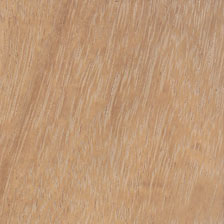Iroko

Other names
chêne d’Afrique, teck d’Afrique, teck kambala,African teak, African oak
Scientific Name
Chlorophora excelsa, Chlorophora regia
Family
Moraceae
Description
Iroko is golden-orange to brown, lighter vessel lines are conspicuous on flat saw surfaces. The material may contain large, hard deposits of calcium carbonate in cavities, and the timber around them may be darker in colour. The grain is interlocked and sometimes irregular and the texture rather coarse, but even, figure mottled. The wood is somewhat greasy and is odourless. Iroko is a highly valued commercial timber in Africa, for which demand is large.
Density
(H=12%) : 0,64
Treatability
Not permeable
Seasoning
The wood dries well in open air and kilns, with little degrade.
Stability
moderately stable
Durability
Iroko is very durable, and is resistant to both rot and insect attack
Workability
Working properties for hand and machine tools are generally good but variable; the interlocked grain may hamper sawing and planing. The wood is rather abrasive due to the presence of hard deposits (‘iroko stones’, mainly consisting of calcium carbonate), which can blunt cutting edges. Tearing in planing can be avoided by using cutting angles of 15° or less. The wood has good nailing, screwing, mortising and gluing properties and turns easily. It finishes well, but filler is needed. The wood contains the stilbene derivative chlorophorin, which prevents oil-based paints from drying, and which corrodes metal in contact with it. Steam-bending properties of the wood are moderate.
End-Uses
- Exterior joinery
- Interior joinery
- Flooring Sliced veneer
- Ship building (planking and deck)
- Interior panelling
- Cabinetwork (high class furniture)
- Turned goods
- Current furniture or furniture components
- Light carpentry
- Cooperage
- Glued laminated
- Stairs (inside)
- Veneer for interior of plywood
- Veneer for back or face of plywood
- Vehicle or container flooring
- Bridges (parts not in contact with water or ground)
Notes : Given the high prices of genuine Teak, Iroko could be considered a low-cost alternative. The wood is stable, durable, and has an overall look that somewhat resembles Teak.
Download the complete data sheet